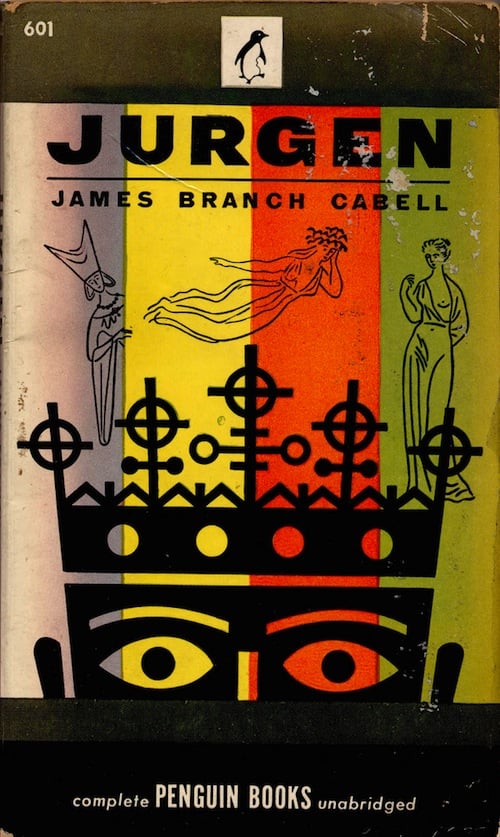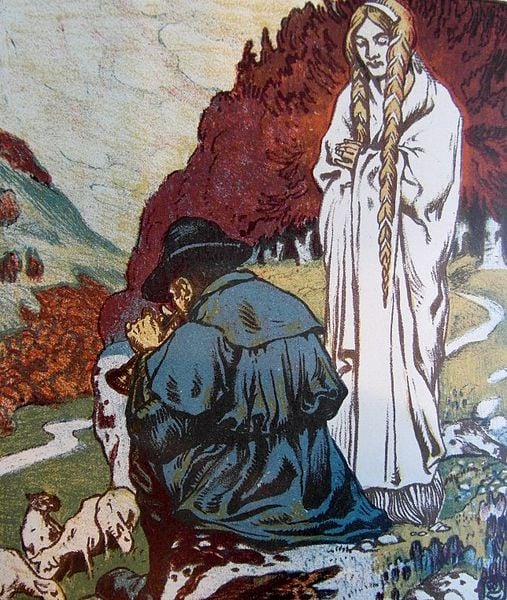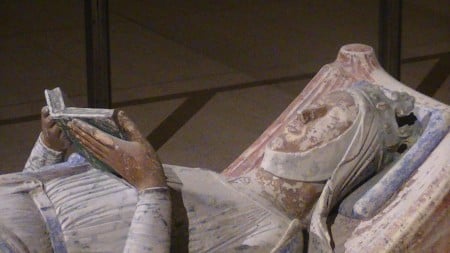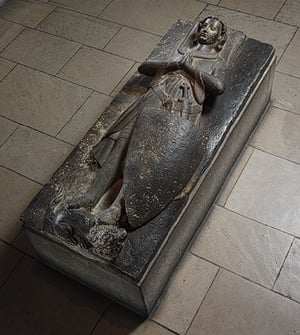Jurgen (9)
By:
May 12, 2015

James Branch Cabell’s 1919 ironic fantasy novel Jurgen, A Comedy of Justice, the protagonist of which seduces women everywhere he travels — including into Arthurian legend and Hell itself — is (according to Aleister Crowley) one of the “epoch-making masterpieces of philosophy.” Cabell’s sardonic inversion of romantic fantasy was postmodernist avant la lettre. HiLoBooks is pleased to serialize Jurgen here at HILOBROW. Enjoy!
Jurgen had behaved with conspicuous nobility, Jurgen reflected: but he had committed himself. “I go in search of my dear wife,” he had stated, in the exaltation of virtuous sentiments. And now Jurgen found himself alone in a world of moonlight just where he had last seen his wife.
“Well, well,” he said, “now that my Wednesday is done with, and I am again a reputable pawnbroker, let us remember the advisability of sometimes doing the manly thing! It was into this cave that Lisa went. So into this cave go I, for the second time, rather than home to my unsympathetic relatives-in-law. Or at least, I think I am going —”
“Ay,” said a squeaking voice, “this is the time. A ab hur hus!”
“High time!”
“Oh, more than time!”
“Look, the man in the oak!”
“Oho, the fire-drake!”
Thus many voices screeched and wailed confusedly. But Jurgen, staring about him, could see nobody: and all the tiny voices seemed to come from far overhead, where nothing was visible save the clouds which of a sudden were gathering; for a wind was rising, and already the moon was overcast. Now for a while that noise high in the air became like a wrangling of sparrows, wherein no words were distinguishable.

Then said a small shrill voice distinctly: “Note now, sweethearts, how high we pass over the wind-vexed heath, where the gallows’ burden creaks and groans swaying to and fro in the night! Now the rain breaks loose as a hawk from the fowler, and grave Queen Holda draws her tresses over the moon’s bright shield. Now the bed is made, and the water drawn, and we the bride’s maids seek for the lass who will be bride to Sclaug.”
Said another: “Oh, search for a maid with golden hair, who is perfect, tender and pure, and fit for a king who is old as love, with no trace of love in him. Even now our grinning dusty master wakes from sleep, and his yellow fingers shake to think of her flower-soft lips who comes to-night to his lank embrace and warms the ribs that our eyes have seen. Who will be bride to Sclaug?”
And a third said: “The wedding-gown we have brought with us, we that a-questing ride; and a maid will go hence on Phorgemon in Cleopatra’s shroud. Hah. Will o’the Wisp will marry the couple —”
“No, no! let Brachyotus!”
“No, be it Kitt with the candle-stick!”
“Eman hetan, a fight, a fight!”
“Oho, Tom Tumbler, ’ware of Stadlin!”
“Hast thou the marmaritin, Tib?”
“A ab hur hus!”
“Come, Bembo, come away!”
So they all fell to screeching and whistling and wrangling high over Jurgen’s head, and Jurgen was not pleased with his surroundings.
“For these are the witches of Amneran about some deviltry or another in which I prefer to take no part. I now regret that I flung away a cross in this neighborhood so very recently, and trust the action was understood. If my wife had not made a point of it, and had not positively insisted upon it, I would never have thought of doing such a thing. I intended no reflection upon anybody. Even so, I consider this heath to be unwholesome. And upon the whole, I prefer to seek whatever I may encounter in this cave.”
So in went Jurgen, for the second time.
And the tale tells that all was dark there, and Jurgen could see no one. But the cave stretched straight forward, and downward, and at the far end was a glow of light. Jurgen went on and on, and so came to the place where he had found the Centaur. This part of the cave was now vacant. But behind where Nessus had lain in wait for Jurgen was an opening in the cave’s wall, and through this opening streamed the light. Jurgen stooped and crawled through the orifice.

He stood erect. He caught his breath sharply. Here at his feet was, of all things, a tomb carved with the recumbent effigy of a woman. Now this part of the cave was lighted by lamps upon tall iron stands, so that everything was clearly visible, even to Jurgen, whose eyesight had of late years failed him. This was certainly a low flat tombstone such as Jurgen had seen in many churches: but the tinted effigy thereupon was curious, somehow Jurgen looked more closely. He touched the thing.
Then he recoiled, because there is no mistaking the feel of dead flesh. The effigy was not colored stone: it was the body of a dead woman. More unaccountable still, it was the body of Félise de Puysange, whom Jurgen had loved very long ago in Gâtinais, a great many years before he set up in business as a pawnbroker.
Very strange it was to Jurgen again to see her face. He had often wondered what had become of this large brown woman; had wondered if he were really the first man for whom she had put a deceit upon her husband; and had wondered what sort of person Madame Félise de Puysange had been in reality.
“Two months it was that we played at intimacy, was it not, Félise? You comprehend, my dear, I really remember very little about you. But I recall quite clearly the door left just a-jar, and how as I opened it gently I would see first of all the lamp upon your dressing-table, turned down almost to extinction, and the glowing dust upon its glass shade. Is it not strange that our exceeding wickedness should have resulted in nothing save the memory of dust upon a lamp chimney? Yet you were very handsome, Félise. I dare say I would have liked you if I had ever known you. But when you told me of the child you had lost, and showed me his baby picture, I took a dislike to you. It seemed to me you were betraying that child by dealing over-generously with me: and always between us afterward was his little ghost. Yet I did not at all mind the deceits you put upon your husband. It is true I knew your husband rather intimately —. Well, and they tell me the good Vicomte was vastly pleased by the son you bore him some months after you and I had parted. So there was no great harm done, after all —”
Then Jurgen saw there was another woman’s body lying like an effigy upon another low flat tomb, and beyond that another, and then still others. And Jurgen whistled.

“What, all of them!” he said. “Am I to be confronted with every pound of tender flesh I have embraced? Yes, here is Graine, and Rosamond, and Marcouève, and Elinor. This girl, though, I do not remember at all. And this one is, I think, the little Jewess I purchased from Hassan Bey in Sidon, but how can one be sure? Still, this is certainly Judith, and this is Myrina. I have half a mind to look again for that mole, but I suppose it would be indecorous. Lord, how one’s women do add up! There must be several scores of them in all. It is the sort of spectacle that turns a man to serious thinking. Well, but it is a great comfort to reflect that I dealt fairly with every one of them. Several of them treated me most unjustly, too. But that is past and done with: and I bear no malice toward such fickle and short-sighted creatures as could not be contented with one lover, and he the Jurgen that was!”
Thereafter, Jurgen, standing among his dead, spread out his arms in an embracing gesture.
“Hail to you, ladies, and farewell! for you and I have done with love. Well, love is very pleasant to observe as he advances, overthrowing all ancient memories with laughter. And yet for each gay lover who concedes the lordship of love, and wears intrepidly love’s liveries, the end of all is death. Love’s sowing is more agreeable than love’s harvest: or, let us put it, he allures us into byways leading nowhither, among blossoms which fall before the first rough wind: so at the last, with much excitement and breath and valuable time quite wasted, we find that the end of all is death. Then would it have been more shrewd, dear ladies, to have avoided love? To the contrary, we were unspeakably wise to indulge the high-hearted insanity that love induced; since love alone can lend young people rapture, however transiently, in a world wherein the result of every human endeavor is transient, and the end of all is death.”
Then Jurgen courteously bowed to his dead loves, and left them, and went forward as the cave stretched.
But now the light was behind him, so that Jurgen’s shadow, as he came to a sharp turn in the cave, loomed suddenly upon the cave wall, confronting him. This shadow was clear-cut and unarguable.
Jurgen regarded it intently. He turned this way, then the other; he looked behind him, raised one hand, shook his head tentatively; then he twisted his head sideways with his chin well lifted, and squinted so as to get a profile view of this shadow. Whatever Jurgen did the shadow repeated, which was natural enough. The odd part was that it in nothing resembled the shadow which ought to attend any man, and this was an uncomfortable discovery to make in loneliness deep under ground.
“I do not exactly like this,” said Jurgen. “Upon my word, I do not like this at all. It does not seem fair. It is perfectly preposterous. Well” — and here he shrugged, — “well, and what could anybody expect me to do about it? Ah, what indeed! So I shall treat the incident with dignified contempt, and continue my exploration of this cave.”
Footnotes from Notes on Jurgen (1928), by James P. Cover — with additional comments from the creators of this website; rewritten, in some instances, by HiLoBooks.
* Holda — Holda was a moon goddess among the primitive Germans.
* Sclaug — In The Silver Stallion, Sclaug is a vampire in the form of an old, yellow gentleman, with webbed fingers, who goes upon all fours. He is the keeper of a library which contains every book ever written.
* Phorgemon — ?
* Will o’ the Wisp — The ignis fatuus, of which this is a common name, was thought to be a spirit which led travelers astray.
* Brachyotus — ?
* Kitt — “Kit with the canstick” is a hob-goblin mentioned in Reginald Scot’s Discovery of Witchcraft (1584).
* Eman Hetan — This was a charm repeated by the witches of the Basses-Pyrenees before flying to the Sabbat.
* Tom Tumbler — This is another spirit which was used in Reginald Scot’s (Discovery of Witchcraft) day to frighten children.
* Stadlin — This was one of the witches in Middleton’s play, The Witch.
* Marmaritin — Scot mentions “Marmaritin, whereby spirits might be raised.”
* Tib — Mother Demdyke (Elizabeth Southernes), who was tried for witchcraft in England in 1612, confessed that she was led astray by a “spirit or devil in the form of a boy wearing a parti-colored coat of brown-and-black” who was named Tibb.
* A ab hur hus — This is a cry which Middleton puts in the mouth of one of his witches. Scot gives it as a charm to cure toothache.
* Bembo — Could this be the same as that “infernal, terrestrial, and celestial Bombo” who is mentioned in an old invocation to Hecate, which is closely paraphrased in Figures of Earth?
* Sidon — Sidon was a seaport city of ancient Phoenicia: the modern Saida.
RADIUM AGE SCIENCE FICTION: “Radium Age” is HILOBROW’s name for the 1904–33 era, which saw the discovery of radioactivity, the revelation that matter itself is constantly in movement — a fitting metaphor for the first decades of the 20th century, during which old scientific, religious, political, and social certainties were shattered. This era also saw the publication of genre-shattering writing by Edgar Rice Burroughs, Sax Rohmer, E.E. “Doc” Smith, Jack London, Arthur Conan Doyle, Aldous Huxley, Olaf Stapledon, Karel Čapek, H.P. Lovecraft, Charlotte Perkins Gilman, Yevgeny Zamyatin, Philip Gordon Wylie, and other pioneers of post-Verne/Wells, pre-Golden Age “science fiction.” More info here.
READ GORGEOUS PAPERBACKS: HiLoBooks has reissued the following 10 obscure but amazing Radium Age science fiction novels in beautiful print editions: Jack London’s The Scarlet Plague, Rudyard Kipling’s With the Night Mail (and “As Easy as A.B.C.”), Arthur Conan Doyle’s The Poison Belt, H. Rider Haggard’s When the World Shook, Edward Shanks’ The People of the Ruins, William Hope Hodgson’s The Night Land, J.D. Beresford’s Goslings, E.V. Odle’s The Clockwork Man, Cicely Hamilton’s Theodore Savage, and Muriel Jaeger’s The Man with Six Senses. For more information, visit the HiLoBooks homepage.
SERIALIZED BY HILOBOOKS: Jack London’s The Scarlet Plague | Rudyard Kipling’s With the Night Mail (and “As Easy as A.B.C.”) | Arthur Conan Doyle’s The Poison Belt | H. Rider Haggard’s When the World Shook | Edward Shanks’ The People of the Ruins | William Hope Hodgson’s The Night Land | J.D. Beresford’s Goslings | E.V. Odle’s The Clockwork Man | Cicely Hamilton’s Theodore Savage | Muriel Jaeger’s The Man With Six Senses | Jack London’s “The Red One” | Philip Francis Nowlan’s Armageddon 2419 A.D. | Homer Eon Flint’s The Devolutionist | W.E.B. DuBois’s “The Comet” | Edgar Rice Burroughs’s The Moon Men | Charlotte Perkins Gilman’s Herland | Sax Rohmer’s “The Zayat Kiss” | Eimar O’Duffy’s King Goshawk and the Birds | Frances Hodgson Burnett’s The Lost Prince | Morley Roberts’s The Fugitives | Helen MacInnes’s The Unconquerable | Geoffrey Household’s Watcher in the Shadows | William Haggard’s The High Wire | Hammond Innes’s Air Bridge | James Branch Cabell’s Jurgen | John Buchan’s “No Man’s Land” | John Russell’s “The Fourth Man” | E.M. Forster’s “The Machine Stops” | John Buchan’s Huntingtower | Arthur Conan Doyle’s When the World Screamed | Victor Bridges’ A Rogue By Compulsion | Jack London’s The Iron Heel | H. De Vere Stacpoole’s The Man Who Lost Himself | P.G. Wodehouse’s Leave It to Psmith | Richard Connell’s “The Most Dangerous Game” | Houdini and Lovecraft’s “Imprisoned with the Pharaohs” | Arthur Conan Doyle’s “The Sussex Vampire”.
ORIGINAL FICTION: HILOBROW has serialized three novels: James Parker’s The Ballad of Cocky The Fox (“a proof-of-concept that serialization can work on the Internet” — The Atlantic); Karinne Keithley Syers’s Linda Linda Linda (which includes original music); and Robert Waldron’s roman à clef The School on the Fens. We also publish original stories and comics. These include: Matthew Battles’s stories “Gita Nova“, “Makes the Man,” “Imago,” “Camera Lucida,” “A Simple Message”, “Children of the Volcano”, “The Gnomon”, “Billable Memories”, “For Provisional Description of Superficial Features”, “The Dogs in the Trees”, “The Sovereignties of Invention”, and “Survivor: The Island of Dr. Moreau”; several of these later appeared in the collection The Sovereignties of Invention | Peggy Nelson’s “Mood Indigo“, “Top Kill Fail“, and “Mercerism” | Annalee Newitz’s “The Great Oxygen Race” | Flourish Klink’s Star Trek fanfic “Conference Comms” | Charlie Mitchell’s “A Fantasy Land” | Charlie Mitchell’s “Sentinels” | Joshua Glenn’s “The Lawless One”, and the mashup story “Zarathustra vs. Swamp Thing” | Adam McGovern and Paolo Leandri’s Idoru Jones comics | John Holbo’s “Sugarplum Squeampunk” | “Another Corporate Death” (1) and “Another Corporate Death” (2) by Mike Fleisch | Kathryn Kuitenbrouwer and Frank Fiorentino’s graphic novel “The Song of Otto” (excerpt) | John Holbo’s graphic novel On Beyond Zarathustra (excerpt) | “Manoj” and “Josh” by Vijay Balakrishnan | “Verge” by Chris Rossi, and his audio novel Low Priority Hero | EPIC WINS: THE ILIAD (1.408-415) by Flourish Klink | EPIC WINS: THE KALEVALA (3.1-278) by James Parker | EPIC WINS: THE ARGONAUTICA (2.815-834) by Joshua Glenn | EPIC WINS: THE MYTH OF THE ELK by Matthew Battles | TROUBLED SUPERHUMAN CONTEST: Charles Pappas, “The Law” | CATASTROPHE CONTEST: Timothy Raymond, “Hem and the Flood” | TELEPATHY CONTEST: Rachel Ellis Adams, “Fatima, Can You Hear Me?” | OIL SPILL CONTEST: A.E. Smith, “Sound Thinking | LITTLE NEMO CAPTION CONTEST: Joe Lyons, “Necronomicon” | SPOOKY-KOOKY CONTEST: Tucker Cummings, “Well Marbled” | INVENT-A-HERO CONTEST: TG Gibbon, “The Firefly” | FANFICTION CONTEST: Lyette Mercier’s “Sex and the Single Superhero”
